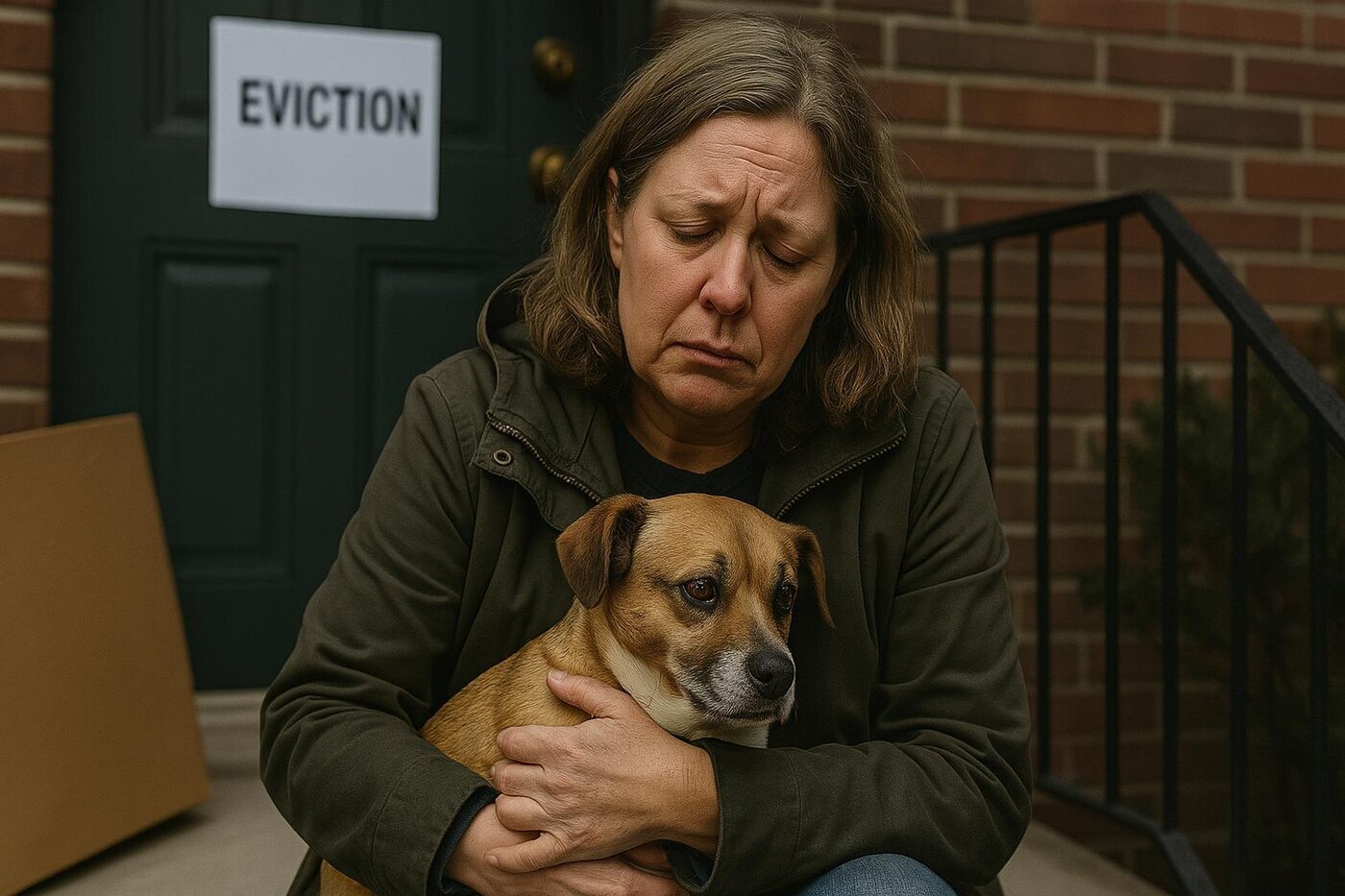Pets and the Housing Crisis - Why Canadians Are Forced to Give Up Their Animals
Brand Story
10 Jul 2025, 20:45 GMT+10
 Facing eviction, a Canadian pet owner clings to her dog as housing barriers force thousands to surrender beloved animals.
Facing eviction, a Canadian pet owner clings to her dog as housing barriers force thousands to surrender beloved animals.
In Canada's increasingly unaffordable housing market, one group of victims is too often overlooked: pets. As renters scramble to secure increasingly scarce and expensive accommodations, thousands of families are being forced to make heartbreaking decisions-to give up beloved animals simply because they can't find a home that will take them both.
This crisis is unfolding in shelters, households, and rental markets across the country. Behind every surrender form is a story of emotional pain, systemic gaps, and a pressing need for change.
Pet-friendly rentals are disappearing
For Canadian pet owners, securing a rental that allows animals has become a formidable challenge. According to the BC SPCA, 31% of residents in British Columbia say they struggle to find pet-friendly housing-a figure echoed across other provinces with tight rental markets. Landlords are increasingly unwilling to accept pets, citing concerns about noise, property damage, or liability. Those who do allow animals often demand steep pet deposits-sometimes up to half a month's rent.
The restrictions are particularly harsh for households with large dogs, multiple pets, or certain breeds that carry unfair stigmas. Vulnerable groups such as seniors, young people, and individuals with disabilities are hit especially hard. These populations are often more likely to live in rental housing-and to rely on their animals for emotional support.
What was once a manageable part of renting-finding a place that accommodates both people and pets-has turned into a barrier that can upend entire lives.
Shelter surrenders on the rise
The ripple effects are visible across Canada's shelter system. Since 2014, the BC SPCA has taken in more than 12,400 animals due to housing-related surrenders. In Prince Edward Island, the Humane Society reported a staggering 134% increase in surrenders in 2022 alone. Alberta shelters, too, frequently report operating at or beyond full capacity, with staff stretched thin and resources running low.
Behind these statistics lie gut-wrenching choices. Many pet owners describe themselves as 'involuntary surrenders,' forced to give up their animals despite desperate efforts to find alternatives. These are not cases of neglect or abandonment-they are cases of systemic failure.
'The vast majority of people who surrender due to housing cry when they bring their pet in,' says a shelter volunteer in Calgary. 'They're not giving up. They've run out of options.'
Overcrowded shelters, overwhelmed staff
The rising tide of surrendered pets puts Canada's animal welfare organizations in an impossible position. Shelters are becoming dangerously overcrowded, leading to an increased risk of disease outbreaks, behavioral problems, and in some cases, euthanasia. Staff, many of whom joined the profession out of compassion for animals, are reporting burnout and emotional exhaustion as they watch healthy pets languish in kennels-or get turned away due to lack of space.
And the cycle is self-perpetuating. With more animals in shelters and fewer families able to adopt due to rental restrictions, the backlog continues to grow. The result is a pet population stuck in limbo-unwanted by landlords, unadoptable under current conditions, and unsupported by public policy.
The emotional toll on families
For pet owners, the experience of surrendering an animal is deeply traumatic. Pets are more than companions-they are members of the family, sources of comfort, and anchors of emotional well-being. Losing a pet to housing instability can trigger grief, guilt, anxiety, and long-term psychological effects.
Children, in particular, may struggle to understand why a family member is suddenly gone. For seniors, who often rely on pets for companionship and structure, the loss can feel like a profound rupture. For individuals living with disabilities or mental health challenges, it can be devastating.
One mother in Vancouver described her experience surrendering a dog as 'worse than moving.' 'It felt like I was abandoning a child,' she said. 'I had no say in it-the landlord said no, and that was the end.'
What solutions are possible?
This intersection of housing policy and animal welfare has begun to attract the attention of advocates, lawmakers, and service providers-but progress remains uneven and slow.
Legislative reform is one path forward. In Quebec, for example, campaigns are underway to ban 'no-pet' clauses in standard lease agreements. Advocates argue that just as tenants can't be discriminated against based on race or religion, neither should they be penalized for having pets-especially when no evidence of damage or disruption exists.
Others propose financial incentives for landlords who accept pets, including tax breaks or access to insurance programs that cover potential damages. Humane Canada and allied organizations also advocate for an expansion of pet-friendly social and subsidized housing, recognizing that pet ownership is not a luxury but a fundamental part of many people's lives.
Technology may also offer part of the solution. Digital platforms like PetsCare.com are helping renters and landlords better navigate pet-related concerns, offering resources on responsible ownership, guidance for pet-inclusive tenancy, and even listings of housing that welcomes animals. While digital tools can't fix housing policy, they are proving valuable in helping pet owners stay informed, connected, and proactive when housing decisions arise.
Meanwhile, public awareness campaigns are working to reduce the stigma around renting to pet owners. By highlighting responsible pet ownership and offering best practices for tenancy agreements, advocates hope to reshape landlord perceptions and reduce blanket bans.
The bigger picture: a housing crisis that affects everyone
Canada's broader housing affordability crisis only exacerbates the pet problem. With rental demand outpacing supply, especially in major cities like Toronto, Vancouver, and Calgary, landlords can afford to be selective-and pets are often the first disqualifier.
At the same time, new rental construction has slowed, and existing units are being converted into short-term rentals or sold off. This leaves pet owners with even fewer options, forcing many into unstable or unsuitable housing-or none at all.
A 2025 market outlook by the Canada Mortgage and Housing Corporation (CMHC) warns of persistent shortfalls in rental availability, particularly for affordable, pet-welcoming housing. Unless structural changes are made, the situation is likely to worsen.
A call for coordinated action
The plight of pets caught in Canada's housing crunch is not just a niche issue-it's a reflection of deeper social priorities. At its core, the crisis raises urgent questions: Who gets to belong in a home? What value do we place on the human-animal bond? And what kind of society allows families to be torn apart by a lease agreement?
Solving the problem will require collaboration across sectors-from legislators and housing authorities to animal welfare groups and tenants' rights advocates. It will also require empathy, recognizing that behind every surrendered pet is a human being trying to make impossible choices.
Canada has long prided itself on being a compassionate society. The question now is whether that compassion will extend to the millions of pets-and people-caught in the margins of the housing market.
Sources:
PetSmart Charities/Gallup Veterinary Access Study, 2025
BC SPCA, PEI Humane Society, Alberta animal shelters
Humane Canada (humanecanada.ca/en/petinclusivehousing)
CMHC Housing Market Outlook 2025 (cmhc-schl.gc.ca)
SAIT Journalism: Invisible Victims of Calgary's Housing Crisis (2024)
Pets Plus Us: Pet-Friendly Housing in Canada
Orca Realty and CanopyMgmt Rental Reports
BC SPCA Advocacy Resources (spca.bc.ca/pet-friendly-housing)
PetsCareCom Inc., 166 Geary St, STE 1500 #1981, San Francisco, CA 94108 US, info@petscare_com, www.PetsCare.com
 Share
Share
 Tweet
Tweet
 Share
Share
 Flip
Flip
 Email
Email
Watch latest videos
Subscribe and Follow
Get a daily dose of Boston Star news through our daily email, its complimentary and keeps you fully up to date with world and business news as well.
News RELEASES
Publish news of your business, community or sports group, personnel appointments, major event and more by submitting a news release to Boston Star.
More InformationBusiness
SectionPwC: Copper shortages may disrupt 32 percent of chip output by 2035
AMSTERDAM, Netherlands: Some 32 percent of global semiconductor production could face climate change-related copper supply disruptions...
U.S. stocks recover after Trump-tariffs-induced slump
NEW YORK, New York - U.S. stocks rebounded Tuesday with all the major indices gaining ground. Markets in the UK, Europe and Canada...
Stocks slide as Trump unveils 25% tariffs on Japan, S. Korea
NEW YORK CITY, New York: Financial markets kicked off the week on a cautious note as President Donald Trump rolled out a fresh round...
BRICS issues rebuke on trade and Iran, avoids direct US criticism
RIO DE JANEIRO, Brazil: At a two-day summit over the weekend, the BRICS bloc of emerging economies issued a joint declaration condemning...
BP appoints ex-Shell finance chief Simon Henry to board
LONDON, U.K.: This week, BP appointed Simon Henry, former Shell finance chief, to its board as a non-executive director effective September...
FedEx, UPS step up as Canada Post loses market share in strikes
OTTAWA, Canada: With Canada Post struggling to maintain operations amid labour unrest, rivals like FedEx and UPS are stepping in to...
Massachusetts
SectionWith Masataka Yoshida back, surging Red Sox open series vs. Rays
(Photo credit: Brian Fluharty-Imagn Images) The Boston Red Sox will try to stretch their winning streak to seven games Thursday night...
Mike Trout, Angels out to end series against Rangers with a bang
(Photo credit: Gary A. Vasquez-Imagn Images) Three games behind the Seattle Mariners and Boston Red Sox for the final wild-card spot...
Cardinals' Miles Mikolas looks to forget subpar outings, conquer Nats
(Photo credit: Jeff Curry-Imagn Images) St. Louis Cardinals starting pitcher Miles Mikolas will seek to get his season back on track...
MLB roundup: White Sox halt Blue Jays' 10-game winning streak
(Photo credit: Kamil Krzaczynski-Imagn Images) Adrian Houser allowed one run over seven innings to help the Chicago White Sox end...
Lucas Giolito, Red Sox bats overpower Rockies
(Photo credit: Brian Fluharty-Imagn Images) Carlos Narvaez, Wilyer Abreu, Romy Gonzalez and Jarren Duran each homered and Lucas Giolito...
Guardians 3B Jose Ramirez pulls out of All-Star Game
(Photo credit: Troy Taormina-Imagn Images) Cleveland Guardians third baseman Jose Ramirez on Wednesday pulled out of next week's...













